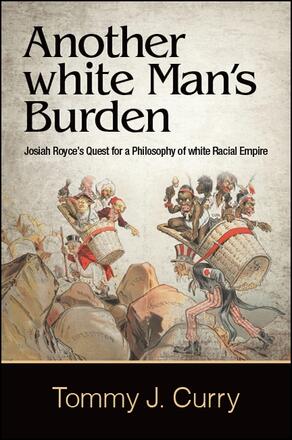
Another white Man's Burden
Josiah Royce's Quest for a Philosophy of white Racial Empire
Alternative formats available from:
Demonstrates the extent to which Josiah Royce’s ideas about race were motivated explicitly in terms of imperial conquest.
Description
Winner of the 2020 Josiah Royce Prize in American Idealist Thought presented by the Josiah Royce Society
Another white Man's Burden performs a case study of Josiah Royce's philosophy of racial difference. In an effort to lay bare the ethnological racial heritage of American philosophy, Tommy J. Curry challenges the common notion that the cultural racism of the twentieth century was more progressive and less racist than the biological determinism of the 1800s. Like many white thinkers of his time, Royce believed in the superiority of the white races. Unlike today however, whiteness did not represent only one racial designation but many. Contrary to the view of the British-born Germanophile philosopher Houston S. Chamberlain, for example, who insisted upon the superiority of the Teutonic races, Royce believed it was the Anglo-Saxon lineage that possessed the key to Western civilization. It was the birthright of white America, he believed, to join the imperial ventures of Britain—to take up the white man's burden. To this end he advocated the domestic colonization of Blacks in the American South, suggested that America's xenophobia was natural and necessary to protecting the culture of white America, and demanded the assimilation and elimination of cultural difference for the stability of America's communities. Another white Man's Burden reminds philosophers that racism has been part of the building blocks of American thought for centuries, and that this must be recognized and addressed in order for its proclamations of democracy, community, and social problems to have real meaning.
Tommy J. Curry is Professor of Philosophy at Texas A&M University and the author of The Man-Not: Race, Class, Genre, and the Dilemmas of Black Manhood.
Reviews
"…everything that goes into making Another white Man's Burden an unlikely inspiration for widespread discussion of Royce also makes it a crucial new work of scholarship for American Philosophy broadly construed. " — The Pluralist
"Not only will this book prove to be informative for anyone concerned with American philosophy, philosophy of race or colonialist studies but, as witnessed throughout the long career of Bauman, it questions and provides a critical alternative to the status quo, while seeking to transcend and transform existing realities. " — Eidos
"By placing Royce on the side of empire, Curry challenges the conventional understanding of Royce's philosophy. This book is a solid example of how to read the canon critically in order to shed light on discourse—in this case mistaken discourse—of intellectual predecessors. Curry's contribution will be of great interest to scholars of Royce and to those working in African American studies, American intellectual history, American philosophy, philosophy of race, and political philosophy. " — CHOICE
"Curry has paid attention to the odd and icky bits of Royce, tracking down the offhand cultural references, the unfamiliar names, and historical contexts. A solid analysis of early twentieth-century conceptions of race and colonialism reveals an unseemly picture before our contemporary eyes. Curry is right; we shouldn't ignore or soft-pedal this. " — Lee A. McBride III, The College of Wooster